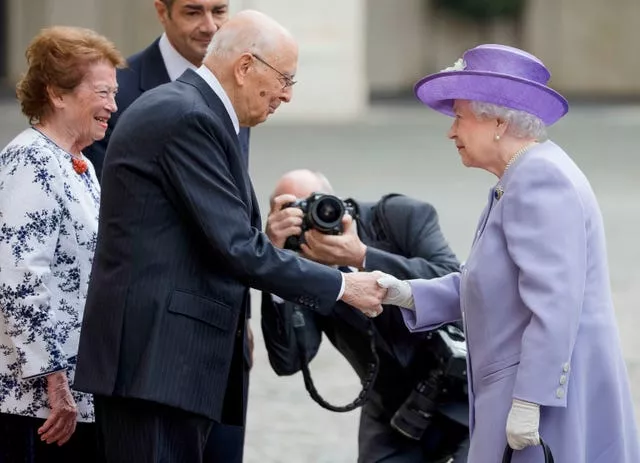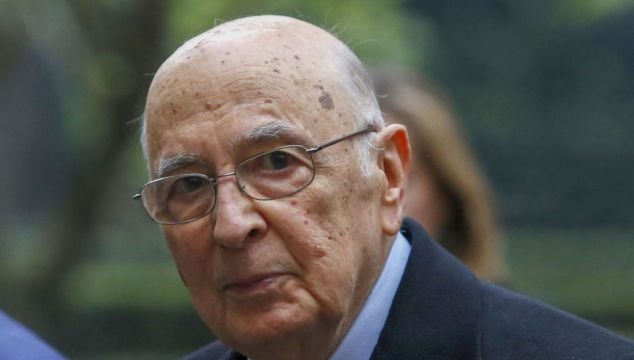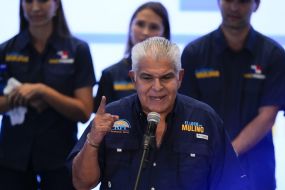Giorgio Napolitano, the first former Communist to rise to Italy’s presidency and the first person to be elected twice to the mostly ceremonial post, has died aged 98.
A statement issued on Friday night by the presidential palace confirmed Italian news reports of the death of Mr Napolitano, who had been treated in a Rome hospital for weeks.
The current president, Sergio Mattarella, hailed his predecessor as head of state, saying that Mr Napolitano’s life “mirrored a large part of (Italy’s) history in the second half of the 20th century, with its dramas, its complexity, its goals, its hopes”.
As a prominent member of what had long been the largest Communist party in the West, Mr Napolitano had advocated positions that often veered from party orthodoxy.

He sought dialogue with Italian and European socialists to end his party’s isolation, and he was an early backer of European integration.
Turin daily La Stampa once wrote of Napolitano: “He was the least communist Communist that the party ever enlisted.”
In a condolence telegram to Mr Napolitano’s widow, Clio, Pope Francis said the late president “showed great gifts of intellect and sincere passion for Italian political life as well as strong interest for the fates of nations”.
The pontiff, who is on a pilgrimage to France, noted he had personal meetings with Mr Napolitano, “during which I appreciated his humanity and long-range vision in assuming with rectitude important choices, especially in delicate moments for the life of the country”.
During the first Gulf War, Mr Napolitano broke with the position of the leader of the Italian Communist Party to oppose the withdrawal of Italy’s tiny contingent.
That amounted to a radical evolution for a Communist politician, who at the time of the 1956 Soviet invasion of Hungary had hailed the suppression as necessary. Ultimately, his political reputation was shaped by his reformist views.
After the fall of the Berlin Wall in 1989, Mr Napolitano was among the staunchest supporters of his party’s reform path, which would eventually lead to changing its name and dropping the hammer-and-sickle symbol.

Premier Giorgia Meloni, whose far-right party is at the opposite end of the political spectrum of the late president, expressed condolences in the name of her government.
Like many other future politicians of his generation, Mr Napolitano fought against the Italian Fascists and Nazi occupiers during the Second World War. When the war ended, he joined the Communist Party, and in 1953, he was elected to Parliament, an office he would hold for 10 straight legislatures.
In 1989, he went to the United States with the party secretary for the first-ever visit by a Italian Communist leader.
While the presidential role is mostly ceremonial, the head of state can send Parliament packing sooner than its normal five-year term if it is hopelessly squabbling, a not-rare occurrence in Italy’s long history of short-lived governments.
The president also taps someone to attempt to form a new government and can reject some of the premier’s Cabinet choices or refuse to sign legislation as a way to encourage Parliament to improve a law.
Supposed to be above the political fray, Italy’s president also can serve as a sort of moral compass for the country and a guardian of the values laid out in Italy’s post-war Constitution.

In 2005, his predecessor in the Quirinal palace, Carlo Azeglio Ciampi, conferred on him one of Italy’s greatest honours, making him a senator-for-life.
A year later, Parliament would make him president of Italy, the first former Communist — and so far the only one — to serve as head of state.
Admirers praised Mr Napolitano’s balanced attitude and gentlemanly ways. He was sometimes dubbed “King Giorgio” but critics pointed to what they saw as excessive caution.
Still, when at the end of his first, seven-year term as head of state, bickering lawmakers could not reach consensus on his successor, he broke with tradition and agreed to be elected to a second term — with the proviso that he would not serve a full term due to advancing age. He was then 80.
Mr Napolitano resigned in January 2015, paving the way for Mr Mattarella, a former Christian Democrat, to be elected.
Beside his wife, whom he married in 1959, Mr Napolitano is survived by two sons, Giovanni and Giulio.







